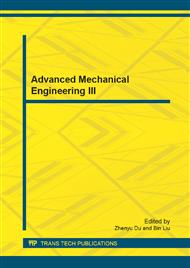[1]
Jianping Gao, Guoming G. Zhu, Elias G. Strangas, et al. Equivalent fuel consumption optimal control of a series hybrid electric vehicle[J]. Proceedings of the Institution of Mechanical Engineers, Part D: Journal of Automobile Engineering, 2009, 223(8): 1003-1018.
DOI: 10.1243/09544070jauto1074
Google Scholar
[2]
Tao Peng, Quanshi Chen, Guangyu Tian, et al. PARAMETER MATCHING OF PARALLEL HYBRID ELECTRIC VEHICLE POWERTRAIN [J]. Chinese Journal of Mechanics, 2003, 39(2): 69-73.
DOI: 10.3901/jme.2003.02.069
Google Scholar
[3]
Zeng Xiaohua. Study on Mechanism of Energy Saving and Method of Parameter Design for Hybrid Electric Bus [D]. Jilin: Jilin University, Automotive engineering college, (2006).
Google Scholar
[4]
Xiaojian Mao, Hu Zhong, Guoqiang Ao, et al. Development and Performance Validation of an ISG Diesel Hybrid Power-Train for City Transit Buses-Part I: Parameter Matching and System Integration[C]. IEEE Vehicle Power and Propulsion Conference (VPPC), 2008. 9.
DOI: 10.1109/vppc.2008.4677406
Google Scholar
[5]
Yu Zhisheng. Automotive theory [M]. Beijing: Mechanical Engineering Press.
Google Scholar
[6]
Wang Baohua, Guo Dongqing, Luo Yongge, et al. Parameter Matching and Orthogonal Optimization for Powertrain of EQ1091 Truck [J]. Automotive Engineering, 2008, 30(7): 613-617.
Google Scholar
[7]
ZHAI Li, SUN Feng-chun. Matching and Design of Electromechanical Transmission System for Electric Cars [J]. Transactions of Beijing Institute of Technology, 2007, 27(10): 869-873.
Google Scholar
[8]
Zeng Xiaohua, Min Haitao, Xu Xing, et al. Parameter Design for Power Train and Performance Simulation of Electrical City Bus [C]. IEEE Vehicle Power and Propulsion Conference(VPPC), 2008. 9.
DOI: 10.1109/vppc.2008.4677713
Google Scholar
[9]
Xiaohua Zeng, Qingnian Wang, Dafeng Song, et al. Parameter Matching for Hybrid Plug-In Bus [C]. IEEE. trans, 2009: 1702-1707.
DOI: 10.1109/vppc.2009.5289688
Google Scholar
[10]
Yongqin Zhou, Chunli Han, Xudong Wang, et al. Research on Power Train Source Matching for Single-axle PHEV[C]. IEEE. Vehicle Power and Propulsion Conference(VPPC), 2008. 9.
DOI: 10.1109/vppc.2008.4677452
Google Scholar
[11]
Luo Yu-tao, Hu Hong-fei, Shen Ji-jun. Analysis and Recognization of Running Cycles of Hybrid Electric Vehicle [J]. Journal of South China University of Technology(Natural Science Edition), 2007, 35(6): 8-13.
Google Scholar
[12]
Wang Wei, Wang Qing-nian, Wang Peng-yu, et al. Rated power and efficiency matching of induction motor for parallel hybrid electric vehicle based on vehicle drive cycle [J]. Journal of Jilin University (Engineering and Technology Edition), 2008, 38(supplement): 12-17.
Google Scholar
[13]
Wei Yueyuan, Zhan Wenzhang, Lin Yi. A Study on the Matching and Optimization of FCHEV Powertrain [J]. Automotive Engineering, 2008, 30(10): 918-922, 933.
Google Scholar
[14]
XIONG Wei-wei, SHU Jie, ZHANG Yong, et al. Parameters Matching for a Series-parallel Hybrid Electric Bus Powertrain System [J]. Journal of Shanghai Jiaotong University, 2008, 42(8): 1324-1328.
Google Scholar
[15]
GB/T19754-2005, Measurement Method of the Energy Consumption On the Heavy Duty Hybrid Electric Vehicle [S]. Beijing: China Standards Press, (2005).
Google Scholar


